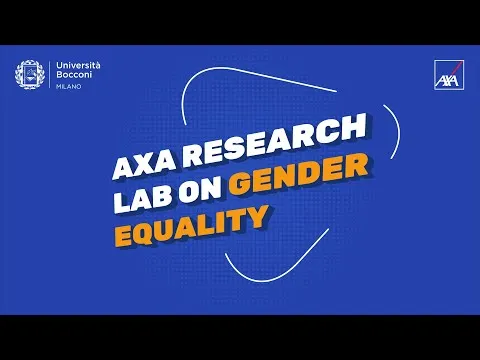
AXA and Bocconi Renew Commitment to Promoting Gender Equality and Women's Empowerment Through Scientific Research
AXA Italy, AXA Research Fund (AXA Group's Global Scientific Philanthropy Initiative) and Bocconi University renew for an additional 3 years the commitment to the AXA Research Lab on Gender Equality to investigate the roots of gender-related gaps and how to close them, through the formulation of recommendations to be addressed to policy makers.
Initiated in 2020 and directed by Professor Paola Profeta, Dean for Diversity, Inclusion and Sustainability and Full Professor of Public Economics at Bocconi University, among the leading international experts on Gender and Public policy issues, the Lab represents a unique example in Italy.
A hub of excellence and innovation, it has been operating for 3 years, adopting a rigorous scientific methodology, an interdisciplinary approach in the fields of economics and gender policies, and a European horizon.
The Lab’s objectives are to raise awareness about gender gaps in society, explore opportunities for women in the economy, encourage institutional decision makers to act, and build a more inclusive society to achieve the goal set in the UN 2030 Agenda for Sustainable Development.
Since its inception, the Lab has worked on 6 research streams (education; work, family and fertility; culture; politics; women's empowerment; and policy), exploring the topic of gender equality across the board and producing 35 research projects, 125 conferences, seminars, lectures, 111 publications, and 3 annual events.
The results achieved so far have been remarkable for their scientific significance: to make one example, the Lab has investigated unconscious gender bias in management and its impact on selection processes, limiting women's access to top positions, as well as the negative correlation between work environments with little attention to harassment cases or with hypercompetitive masculinity and women's careers.
In the educational area, great attention was given to the gender divide in STEM subjects, highlighting the need for action both on current models of skills assessment, basically based on multiple-choice and timed tests, which tend to penalize women, and on the importance of working on role models to dispel stereotypes that make girls and boys think that there still are jobs for women or for men only.
Again, in the political/economic area, research has made it clear that there is a positive relationship between gender equality and wealth redistribution systems.
On the social front, the strong correlation between issues related to population aging and gender divide has been evidenced: in countries where there are more women in the labor market, fertility rates are higher, suggesting that gender equality in the labor market may balance the aging process, while family-related research has focused on the study and measurement of the impact of Covid in terms of “she-cession” but also its long-term effects, such as the redistribution of family workloads due to the widespread diffusion of remote working.
At the heart of the renewed effort for the next 3 years there is an additional research effort with a specific focus on the labor market, with the study, for instance, of the impact of gender stereotypes on selection processes; on policies, with the goal of providing continued policy recommendations to foster gender equality; and in education, with further exploration of women's access to STEM subjects.
New research will involve specific projects on increasingly pressing issues, such as the study of the effects of AI on gender inequality, potential biases in the workplace related to specific clusters (i.e. working mothers, single mothers, women with disabilities, LGBTQ+), gender gaps and caregivers.
“Bocconi, through rigorous and interdisciplinary research, is constantly engaged in the critical analysis of the social and economic structures that underpin inequality and, through the AXA Lab in particular, gender gaps and gender discriminations. We believe that promoting gender equality is not only a moral duty, but also a catalyst for sustainable and inclusive economic growth. Eliminating these disparities in labor markets and in the economy would not only lead to greater well-being and prosperity for women, but also contribute to a fairer and more resilient society for all. Only through concerted efforts and an inclusive vision can we build a future in which every individual has the opportunity to fulfil their potential, regardless of gender,” commented Francesco Billari, Rector of Bocconi University.
“Closing the gender gap is an inescapable moral and economic imperative that requires appropriate political actions, which in turn can only be successful if supported by rigorous research into the real causes of gender inequality,” stressed Chiara Soldano, CEO of the AXA Italia Insurance Group. “With Bocconi and AXA Research Fund we have set a unique and distinctive example in this regard that we continue to support proudly, in the knowledge that there is still a lot of work to do to eliminate the gender gap and that this challenge calls on all the parties in our society: institutions, companies, researchers. Gender equality, inclusion, and women's empowerment are pillars of AXA's strategy, a commitment that we carry out as an employer towards our people, as a company towards the market and our clients, but also towards society, with very concrete projects, such as this one, through which we want to help produce the cultural change that is essential to build more inclusive and sustainable societies, in which being a woman is not a risk.”
“At AXA Research Fund, we firmly believe in the central role that science and research can play in imagining new solutions to close the gender gap,” said Julia d'Astorg, Head of the AXA Research Fund. “The AXA Research Lab at Bocconi University, developed in close collaboration with AXA Italia, is tangible evidence of AXA Group's commitment to society to encourage the reduction of the gender gap. I strongly believe that by supporting philanthropic research and, with it, the adoption of evidence-based decisions, we can play a crucial role in the process of making our societies stronger and more adaptable. Thanks to Professor Paola Profeta and her team, we will face the future with greater confidence, fully consistent with AXA's inclusive strategy."
“In just three years, the AXA Research Lab on Gender Equality has emerged as a leading authority in academic research concerning women's participation in the labor market and economic empowerment. With the support of the AXA Research Fund and AXA Italy, we will continue our commitment to exploring the root causes of gender disparities in education and the labor market, and the persistent under-representation of women in leadership roles, as well as to identifying and advocating for the most effective policies to bridge these gaps. At the Axa Gender Lab, we cultivate a dynamic environment that fosters collaboration and exchange among students, researchers, and visiting scholars from across the globe. Moreover, our research intersects with policy discussions, facilitating the emergence of innovative initiatives and the hosting of engaging events. It's a vibrant hub where ideas thrive and actions take root, driving us toward a more equitable future,” as Paola Profeta, Dean for Diversity, Inclusion and Sustainability, Full Professor of Public Economics at Bocconi University and Director of the AXA Research lab on Gender Equality, declared.


